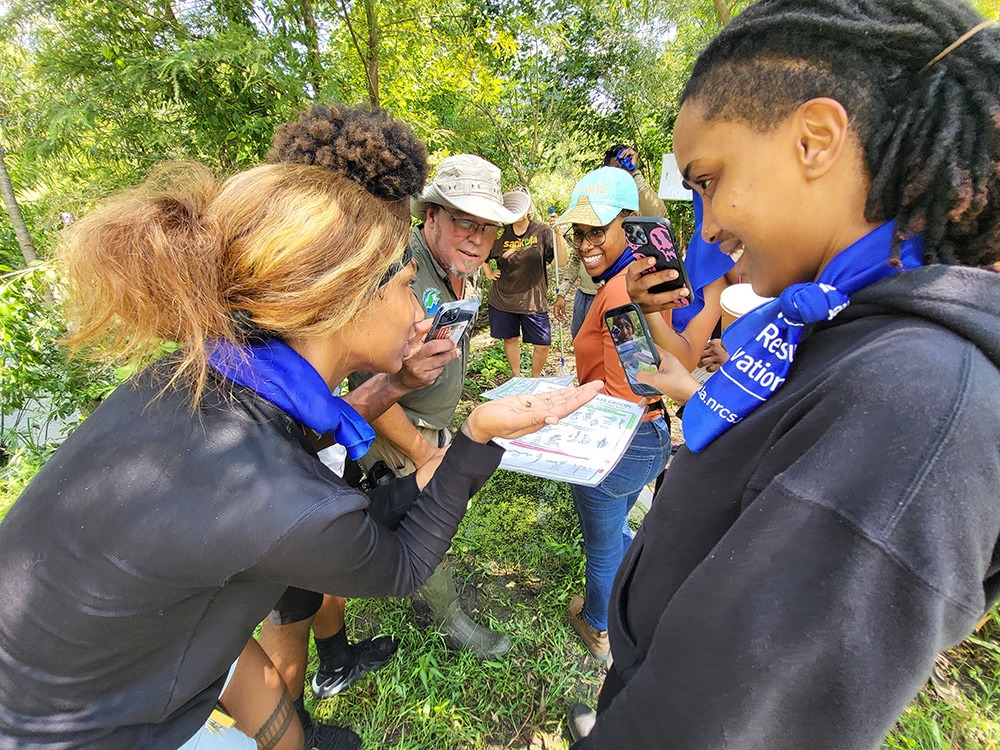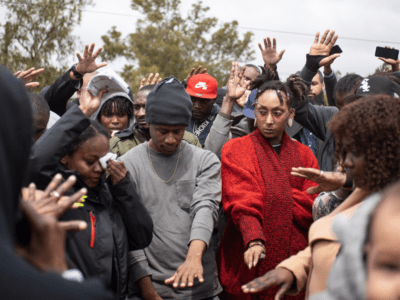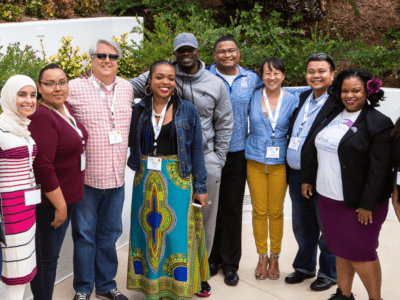This post is also available in: Kreyòl (Haitian Creole)
Like so many, when COVID-19 forced Fabien Harper out of his job, he started rethinking how to earn a living.
“I picked up a lawn mower and a weed eater and started cutting,” Harper said.
He quickly built up a small clientele of homeowners, but it wasn’t enough to cover rent and other everyday expenses. On the hunt to increase his earnings, expand his expertise and grow his business, he came across an ally in a 40-acre wetland park set along a former marshland in a once bustling corner of the Lower 9th Ward.
Harper had enrolled in a class at Delgado Community College to learn how to design lawns to mitigate stormwater runoff. That class introduced him to the Sankofa Wetland Park, where students can get certified in clean water management among rolling knolls of grass and Louisiana native trees.
“We see this space being a catalyst for more,” said Rashida Ferdinand, founder and CEO of the Sankofa Community Development Corporation, a nonprofit that manages the park and launched the pilot certification program in 2023 with Delgado Community College. Ferdinand calls the park a training ground for future scientists, environmentalists and business owners who are focused on capitalizing on New Orleans’ uniqueness as a city surrounded by water, especially in the face of climate change.
“They reinforced in me that I’m on the right track,” Harper said, adding that he learned to cultivate native landscapes that slow erosion and build resilience to ever-stronger hurricanes. “That training and the credentials they gave me has put my business in a more competitive advantage as it relates to stormwater management services.”
Sankofa, which translates to “go back and get it” in the Akan language of Ghana, has long approached community revitalization holistically. In addition to managing the wetland park, the organization runs a food pantry and strategizes how to attract businesses to the Lower 9th Ward’s commercial corridors.
The Clean Water Certification pilot program is its first foray into growing New Orleans’ investment in the green and blue economy. Economists and city advocates say the city can be at the vanguard of jobs rooted in managing the natural environment of urban settings.
The goal is to take “students in disadvantaged populations in the city and let them know that this possibility exists for them,” said Khalid Gross, the business and industry development manager at Delgado. “We have achieved that part of introducing some of our students to this opportunity.”
Like other pockets of New Orleans, the Lower 9th Ward has not fully recovered from Hurricane Katrina in 2005. Nearly 35% of the community lives below the federal poverty line and more than 20% of the lots in the iconic neighborhood are vacant.
In that disparity, there is opportunity, Ferdinand said. She characterized the pilot program as a model of what a collaborative partnership between two like-minded New Orleans institutions – Sankofa and Delgado – can do. This presents an opportunity for Sankofa to work in collaboration with other workforce development and green infrastructure educational programs working across the city.
The Sankofa Wetland Park can be a space where students engage in experiential hands-on learning in an outdoor classroom space within the natural environment.
“What if we had an actual learning space where people could have direct job training workshops? It would be most impactful if this pilot program could grow into a permanent satellite space that hosts green jobs training programs with committed partners,” she said.
The clean water management pilot program has graduated 47 people; it hopes to train 200 students in the next two years and place 80% of them in climate-focused jobs. With starting green job salaries between $23,000 and $61,000 a year, Sankofa estimates these careers could raise median incomes and add $9.8 million into the local economy every year.
“First we have to educate the public on the importance of what this industry means to the city,” Gross said. “We have students who may have some interest (in green infrastructure careers), but they don’t have the full breadth of what this is about.”

Students at Sankofa Wetland Park laugh during one of the many class expeditions. Photo credit: Sankofa Community Development Corporation
On a brisk, sunny October afternoon, a group of a dozen Delgado Community College students walked along the water’s edge in the Sankofa Wetland Park. Instructors pointed out the native Louisiana trees – bald cypress, pumpkin ash, tupelo – and explained their lifecycles and impact on soil preservation. They later snipped small branches from a bald cypress to learn how to propagate new trees from the cuttings.
As the class wrapped up, Delgado student Kayla Martin reflected on what she learned. She joined the program as an elective to her training program in welding. Now she is dreaming of cultivating some property of her own as a windbreak against climate change.
Sankofa, she said, showed her the power of using “the natural habitat to teach people how to take care of the land.”








Comments